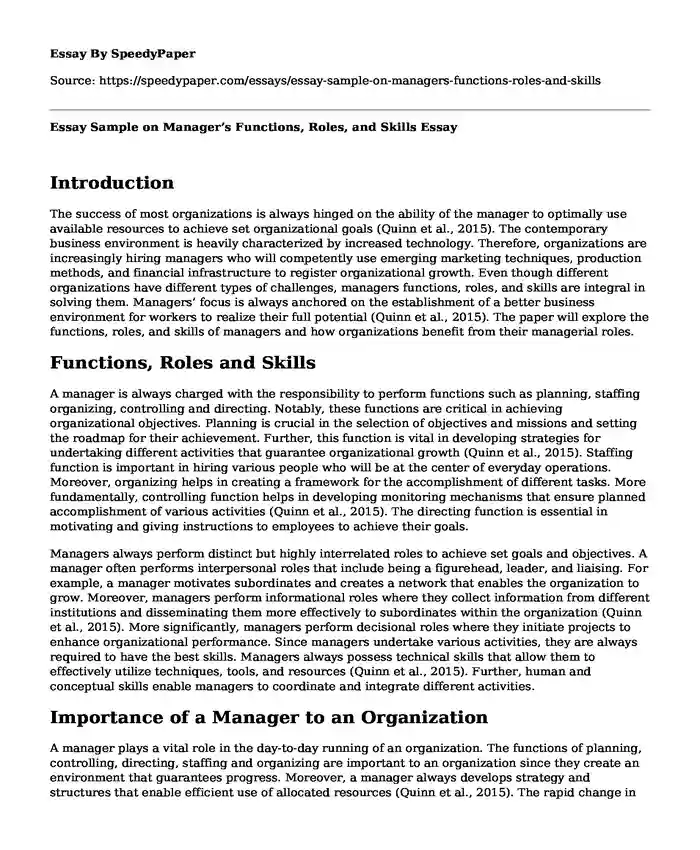
| Type of paper: | Essay |
| Categories: | Management |
| Pages: | 3 |
| Wordcount: | 694 words |
Introduction
The success of most organizations is always hinged on the ability of the manager to optimally use available resources to achieve set organizational goals (Quinn et al., 2015). The contemporary business environment is heavily characterized by increased technology. Therefore, organizations are increasingly hiring managers who will competently use emerging marketing techniques, production methods, and financial infrastructure to register organizational growth. Even though different organizations have different types of challenges, managers functions, roles, and skills are integral in solving them. Managers’ focus is always anchored on the establishment of a better business environment for workers to realize their full potential (Quinn et al., 2015). The paper will explore the functions, roles, and skills of managers and how organizations benefit from their managerial roles.
Functions, Roles and Skills
A manager is always charged with the responsibility to perform functions such as planning, staffing organizing, controlling and directing. Notably, these functions are critical in achieving organizational objectives. Planning is crucial in the selection of objectives and missions and setting the roadmap for their achievement. Further, this function is vital in developing strategies for undertaking different activities that guarantee organizational growth (Quinn et al., 2015). Staffing function is important in hiring various people who will be at the center of everyday operations. Moreover, organizing helps in creating a framework for the accomplishment of different tasks. More fundamentally, controlling function helps in developing monitoring mechanisms that ensure planned accomplishment of various activities (Quinn et al., 2015). The directing function is essential in motivating and giving instructions to employees to achieve their goals.
Managers always perform distinct but highly interrelated roles to achieve set goals and objectives. A manager often performs interpersonal roles that include being a figurehead, leader, and liaising. For example, a manager motivates subordinates and creates a network that enables the organization to grow. Moreover, managers perform informational roles where they collect information from different institutions and disseminating them more effectively to subordinates within the organization (Quinn et al., 2015). More significantly, managers perform decisional roles where they initiate projects to enhance organizational performance. Since managers undertake various activities, they are always required to have the best skills. Managers always possess technical skills that allow them to effectively utilize techniques, tools, and resources (Quinn et al., 2015). Further, human and conceptual skills enable managers to coordinate and integrate different activities.
Importance of a Manager to an Organization
A manager plays a vital role in the day-to-day running of an organization. The functions of planning, controlling, directing, staffing and organizing are important to an organization since they create an environment that guarantees progress. Moreover, a manager always develops strategy and structures that enable efficient use of allocated resources (Quinn et al., 2015). The rapid change in technology has made it necessary for managers to use modern techniques to forecast organizational performance. In light of this, managers utilize varied organizational tools and methods of production to enhance their performance. Further, manager’s ability to use technical and conceptual skills is critical for bringing a practical solution to different organizational challenges.
How What I have Learned Relates to Manager’s Job
Understandably, the manager’s job involves performing functions such as planning, organizing, staffing, directing, and controlling. Further, a manager’s role relates to what I have learned such as interpersonal, informational and decisional roles. Additionally, application of different skills to achieve organizational goals relates to concepts I have learned such as technical, human and conceptual skills that should be blended to bring high organizational performance.
Conclusion
It should be noted that managers are the cog on which the wheel of any organization rotates. Consolidation of managers’ functions, roles, and skills are vital in creating an environment that promotes organizational growth. Moreover, their decisional roles and planning function has become integral in the contemporary business environment that is defined by rapid technological advancement. Organizations should focus on hiring managers who possess a unique set of skills that will enable them to effectively use available resources to achieve organizational goals and objectives.
References
Quinn, R. E., Bright, D., Faerman, S. R., Thompson, M. P., & McGrath, M. R. (2015). Becoming a master manager: A competing values approach. John Wiley & Sons.
Cite this page
Essay Sample on Manager's Functions, Roles, and Skills. (2023, Oct 15). Retrieved from https://speedypaper.com/essays/essay-sample-on-managers-functions-roles-and-skills
Request Removal
If you are the original author of this essay and no longer wish to have it published on the SpeedyPaper website, please click below to request its removal:
- Project Management Free Essay: Gantt Chart Example
- Essay Example on Situation Crisis Theory
- Essay Example on Resilience in the Workplace
- Essay Sample on Culture or Climate in the WorkPlace
- Free Essay Example on Forex Trading
- Paper Example. Training and Development in Walmart Organization
- Business Report: Defining Yourself as a Leader
Popular categories




